Imagine that I sold wine via the Internet. This year, I advertise the "Hobbes-hao 904", which you duly purchase from me for the sum of $43.98 (for argument's sake). You wait a few days, and the postman delivers a well-packed parcel.
You're hoping for good things, because you've read my blog entries that described my trip to Bordeaux. Maybe I selected the grapes myself - perhaps even from old vines. So, you're hopeful. Personal productions are great, you think to yourself! What can this Hobbes-hao 904 be like?
You excitedly open the postman's delivery to find a commercially-packaged box that reads "Blue Nun"*. It has a brand logo, a Quality Standard number, and the innumerable images and trademarks that such wines usually carry. It even has its own name, "Blue Nun Prosperous-Age Aromatic Wine" written over the front in big letters.
Wasn't this supposed to be Hobbes-hao 904?
You open the box to have a look at the bottle, to find that the bottle itself has a commercial label, and a commercial ticket telling you all about the factory (Blue Nun) and this "Blue Nun Prosperous-Age Aromatic Wine".
Curious, you think. What happened to all that "personal production Hobbes-hao 904" stuff? You look over the box more carefully, and find a little white sticker on the back that reads "Hobbes-hao 904".
You're hoping for good things, because you've read my blog entries that described my trip to Bordeaux. Maybe I selected the grapes myself - perhaps even from old vines. So, you're hopeful. Personal productions are great, you think to yourself! What can this Hobbes-hao 904 be like?
You excitedly open the postman's delivery to find a commercially-packaged box that reads "Blue Nun"*. It has a brand logo, a Quality Standard number, and the innumerable images and trademarks that such wines usually carry. It even has its own name, "Blue Nun Prosperous-Age Aromatic Wine" written over the front in big letters.
Wasn't this supposed to be Hobbes-hao 904?
*Blue Nun is a crushingly mediocre brand of German wine that is popular throughout the world.
You open the box to have a look at the bottle, to find that the bottle itself has a commercial label, and a commercial ticket telling you all about the factory (Blue Nun) and this "Blue Nun Prosperous-Age Aromatic Wine".
Curious, you think. What happened to all that "personal production Hobbes-hao 904" stuff? You look over the box more carefully, and find a little white sticker on the back that reads "Hobbes-hao 904".
You know that I love personal productions. The Nadacha teas are fresh and charming; the Maison de Trois Thes cake that I've had was really lovely. Yunnan Sourcing's own-brand productions are fun. Private maocha selections by travelling friends have all turned out to be most enjoyable. There's something wholesome about personal productions. Is this a personal production, or is it Blue Nun with a small label on the back?
An apostrophe:
I'm aware that I my previous articles on teas from Puerh Shop have tended towards being quite negative. Let's have a quick look at that before we go on, because I don't want to seem biased: I was nonplussed by last year's Meiguohao cakes; I was surprised that a minor-factory Gujun brick was being labelled as "Douji"; and the Menghai Pengcheng was just another example of minor-label filler. However, I've also enjoyed the Douji "Dadou" bricks, and plenty of decent maocha from Puerh Shop.
I hope it's very clear that my motivation is simply to describe the teas as I find them. This is a record for my own use, as much as anything, so I aim to be honest with my findings. If my Puerh Shop comments are negative overall, that's just my impression of the tea and how that tea is sold - and I'm just one humble voice among many tasters more qualified than me. I admire the proprietor's dedication to tea, and the Puerh Shop "customer experience" is first rate in terms of delivery (and, often, price).
That said, I have some serious problems with this tea! So, with due apologies to the proprietor of Puerh Shop, let me discuss this cake as I find it. I will raise some negative points, but this is because I believe that they should be raised. I'll continue to buy from Puerh Shop, but constructive dissent is healthy!
An apostrophe:
I'm aware that I my previous articles on teas from Puerh Shop have tended towards being quite negative. Let's have a quick look at that before we go on, because I don't want to seem biased: I was nonplussed by last year's Meiguohao cakes; I was surprised that a minor-factory Gujun brick was being labelled as "Douji"; and the Menghai Pengcheng was just another example of minor-label filler. However, I've also enjoyed the Douji "Dadou" bricks, and plenty of decent maocha from Puerh Shop.
I hope it's very clear that my motivation is simply to describe the teas as I find them. This is a record for my own use, as much as anything, so I aim to be honest with my findings. If my Puerh Shop comments are negative overall, that's just my impression of the tea and how that tea is sold - and I'm just one humble voice among many tasters more qualified than me. I admire the proprietor's dedication to tea, and the Puerh Shop "customer experience" is first rate in terms of delivery (and, often, price).
That said, I have some serious problems with this tea! So, with due apologies to the proprietor of Puerh Shop, let me discuss this cake as I find it. I will raise some negative points, but this is because I believe that they should be raised. I'll continue to buy from Puerh Shop, but constructive dissent is healthy!
Shown above, the only sign that this cake has something to do with Puerh Shop. It's the little white label on the back of a commercial cake.
Pictured above, the commercial neipiao, telling us about the produce of Menghaixian Juming Tea Co.
Below, the cake (which looks great) and its commercial neifei.
Below, the cake (which looks great) and its commercial neifei.
My problems with this cake centre on the manner in which it is sold:
1. The product description says "this is the most expensive tea cake we ever made", and that "we called it Chengshi Mingxiang".
I believe that representing to be involved in the manufacture of this tea ("we made") or the naming of this tea ("we called it") is, to be brutally honest, entirely disingenuous.
This cake has been made by the Menghaixian Juming factory, under their "Xianxianhao" brand (which is clearly written on the front of the cake), and the cake's name that they have given to it is "Shengshi Mingxiang". I cannot see any involvement from Puerh Shop that justifies the use of "we".
To make such representations is to mislead the customer. Is it an honest mistake, or is it willful disingenuity?
2. My Chinese is pretty rubbish, but if you'll allow me to correct Puerh Shop's translations (!), the factory's name is Menghaixian Juming, not "Menghai Jiming" and the cake's name is Shengshi Mingxiang [prosperous-age], not "Chengshi" [ladel-age?!]. Sheng and Cheng have the same character, but totally different meanings (prosperous/flourishing vs. ladel/containing). If you named it, why do you use the wrong character for the name?
1. The product description says "this is the most expensive tea cake we ever made", and that "we called it Chengshi Mingxiang".
I believe that representing to be involved in the manufacture of this tea ("we made") or the naming of this tea ("we called it") is, to be brutally honest, entirely disingenuous.
This cake has been made by the Menghaixian Juming factory, under their "Xianxianhao" brand (which is clearly written on the front of the cake), and the cake's name that they have given to it is "Shengshi Mingxiang". I cannot see any involvement from Puerh Shop that justifies the use of "we".
To make such representations is to mislead the customer. Is it an honest mistake, or is it willful disingenuity?
2. My Chinese is pretty rubbish, but if you'll allow me to correct Puerh Shop's translations (!), the factory's name is Menghaixian Juming, not "Menghai Jiming" and the cake's name is Shengshi Mingxiang [prosperous-age], not "Chengshi" [ladel-age?!]. Sheng and Cheng have the same character, but totally different meanings (prosperous/flourishing vs. ladel/containing). If you named it, why do you use the wrong character for the name?
In the absence of any other information, the above two points lead me to conclude that this is some chap's cake that has been purchased and relabelled. No big deal, relabelling is fine. Why claim to have made it, or named it, though?
If, indeed, this is true, then how can it be "exclusive" to Puerh Shop?
Concerns about disingenuity aside, the actual tea is really very nice. I can see why Puerh Shop are stocking it, even if it is under a curious relabelling, because it is tasty!
The leaves, even at this hyper-green stage, are tasty. The majority are whole (pictured above), and they are strong. They impart a solid yellow soup (pictured below), which has a chunky, buttery scent of which you can be proud.
The leaves, even at this hyper-green stage, are tasty. The majority are whole (pictured above), and they are strong. They impart a solid yellow soup (pictured below), which has a chunky, buttery scent of which you can be proud.
The tea marches on for a long time, delivering solid texture; creamy, buttery notes; and a fine huigan. It is punchy and enjoyable. Yes, it even reminds me of a tuned-down version of Nadacha's 2009 Mahei Qiaomu.
So, we have a very pleasant tea (probably worth $43.98, if you're as used to Western prices as most of us), which is marketed in a potentially troubling way.
Once again, because I know the owner of Puerh Shop will read this: love the shop, keep up the good work, and please take my criticism constructively, in the spirit in which it is intended. No-one likes being criticised, I know, but I'd be cheating my readers if I weren't honest in my opinions.
Once again, because I know the owner of Puerh Shop will read this: love the shop, keep up the good work, and please take my criticism constructively, in the spirit in which it is intended. No-one likes being criticised, I know, but I'd be cheating my readers if I weren't honest in my opinions.
"Drinking an American Hao is every tea enthusiast's envy for joy."

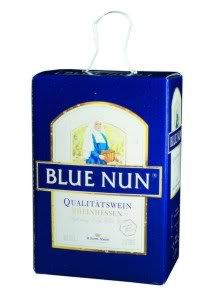

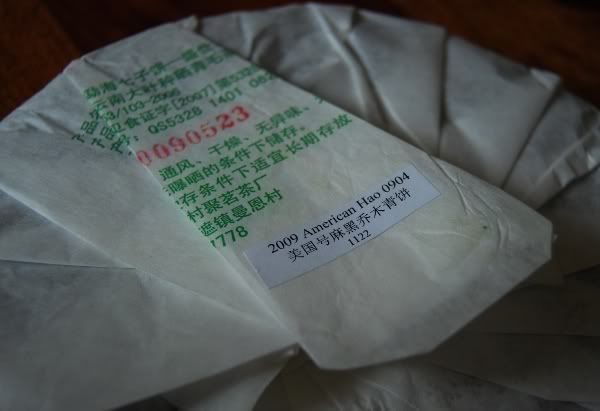
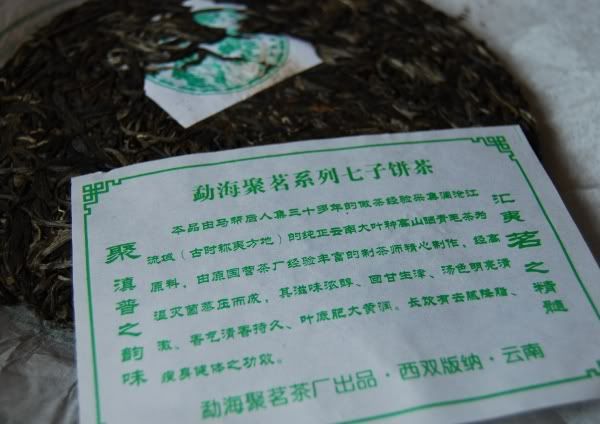
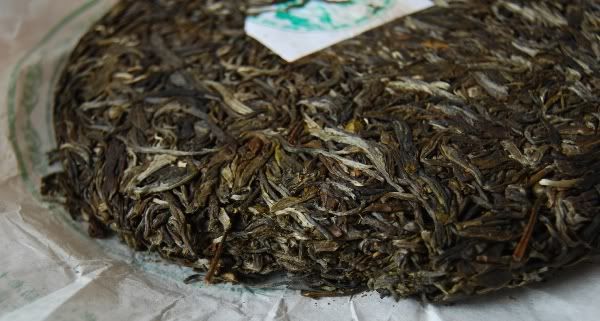
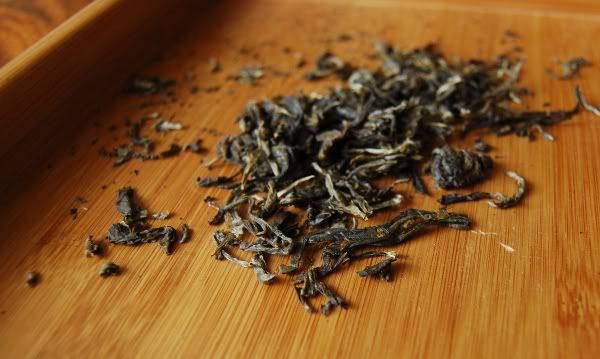
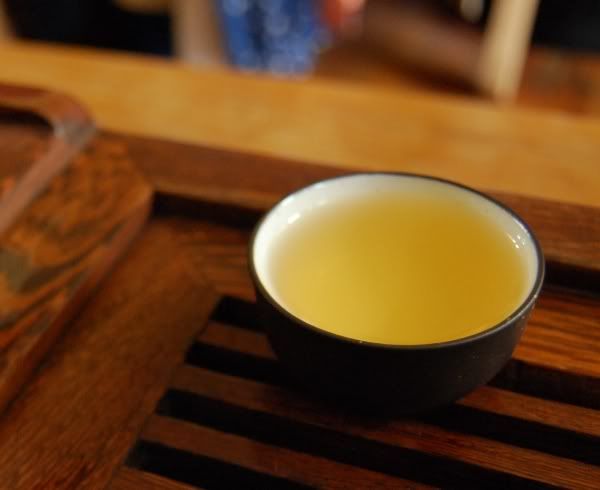
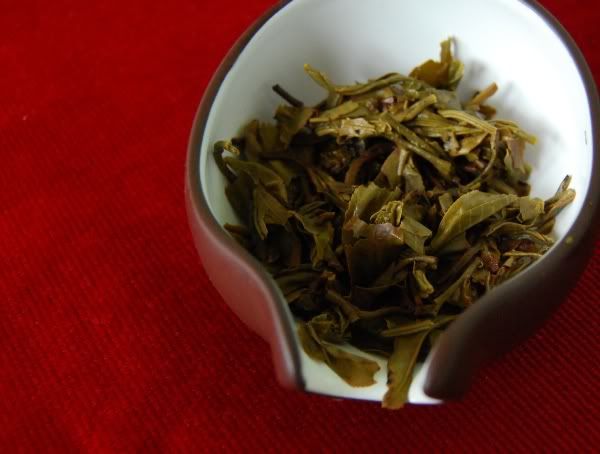
18 comments:
Hi, Hobbes
I am glad you liked the tea.
Your points were well taken.
On the packing of the cake, maybe I should print a few words before the cake was put up for sale.
Remember all previous American Hao cakes we made - a plain paper wrapper was used.
In 2009, I prepared one paper wrapper, that was given to American Hao 0902, but I needed more for other cakes I was going to make. To use a plain paper again? Menghai Juming factory (I did see a 'xian' character anywhere in the name) suggested I could make use of their already made packing materials, and I agreed.
The point is: are you buying a tea or you are buying the packing?
Jim
Puerhshop
I have added the following to the product description:
The cake is packed in Menghai Jiming Tea Factory's wrapper as part of the money saving measure in making American Hao affordable. If you find another cake with the same tea in the same packing from another source, you are qualifying for a full refund.
Dear Jim,
Thanks for being such a good sport and bearing with my criticism.
I understand that you're using a different wrapper - no problem there, as I said in the article - but the product description confuses me: by saying "we called this tea chengshi mingxiang", you're sort of saying that the wrapper was your tea. Of course, Shengshi Mingxiang is the name of the cake that's already out there, the wrapper (and neipiao, and neifei) of which the factory reused for your tea.
My real point is that, reading the product description, I don't know which of the following is correct:
1. This is your tea, with your selected leaves, wrapped in another tea's reused wrapper.
or
2. This is the "Shengshi Mingxiang" cake, from the "Xianxianhao" brand of the "Menghaixian Juming" tea factory, onto which you've put a sticker.
It sounds as if you're saying that #1 is the case? I'm unsure, still :)
As you say, we buy the tea and not the wrapper, but I think the customer wants to know exactly what tea he's drinking - especially, in my case, if it means keeping an eye out for more teas from Menghaixian Juming factory because they were tasty!
Thanks for the clarification,
Hobbes
Once again, I failed to see a 'xian' character anywhere in the name for the tea factory.
You may be laughing at me, but sometimes some controversy is good for marketing purpose. Take a look at the name: American Hao.
The matter of the fact is, Menghai Juming Tea Factory did me a favor by offering their wrappers for my tea cakes, and they trusted: 1. My teas were very good for their name, and 2. I was going to sell these cakes in Chinese market, so bearing a QS logo and full blown factory information would help.
I am going to make more new teas with this factory, I think they did a great job, no regret there.
Thanks for your understanding.
Dear Jim,
Thanks muchly for the reply. I forgot to mention your query regarding the "xian" character - excuse me for that. You can see it in the expected place on the cake's wrapper, curling around the bottom of the cake where every cake has its factory name. Check out the image in the original article (which I link here for convenience). The "xian" comes after "Menghai" and before "Juming". It's written in orange, in traditional script, and is comprised of radicals jiao_1 + xi_4.
I can easily see why you'd use the factory - they've done a great job. The quality of the tea speaks for itself - it's tasty indeed. I hope that came out in the original article!
My confusion arises from the fact that the factory re-used the wrappers from another tea, but that you also claimed "we called this tea Chengshi Mingxiang" - when that was in fact the name of the tea (under the xianxianhao brand) from which the factory borrowed the wrappers. Somewhere out there in the big wide world of pu'er is a tea called Chengshi Mingxiang, and it's not your (very tasty) cake!
No foul, but it's confusing for the customer, which is why I raise it - I don't know if I'm buying tea you selected, or if it's just something you bought in pre-made cake format from a factory somewhere.
I hope you can understand where the customer confusion has arisen. Thanks again for taking the time to add the information required to unravel the confusion.
Toodlepip,
Hobbes
An interesting insight to the world of; ether procurement.
I must admit that: Re-Labelling and Re-Purposing of packaging is common and accepted practice in MLC. It’s not unusual to have TGY packaged in a Long Jing bag/box and a small TGY label applied. The shop will use what’s to hand if they run out of the requisite packaging.
I applaud both you and the vendor for the open dialogue on a point that most would miss or not know to look for. 10 out of 10 to the vendor on the cake name. john
It is indeed that I overlooked the naming issue.
Here 'Xian' means County. The factory name can be "Menghai Jiming Tea Factory". Or "Menghai Xian(county) Jiming Tea Factory".
Likewise, we could call 'Menghai Tea Factory' as 'Menghai Xian(county) Tea Factory'.
Yes, American Hao 0904 is packed in a borrowed wrapper, and that wrapper has a name printed on it already. Does it mean we could not use the same 'Shengshi Mingxiang' naming even the factory agreed to it?
In any event, I appreciated all comments you made towards our products, and the lessons have been learnt.
What a confusion!
How much does it cost to get some proper wrappers made up?
What a cluster****! Does the wrapper represent the tea as being something more than what it really is? Or is it the case of your not sure what youve got because the wrapper does not represent what the tea is being sold as? Dubious!
Hobbes & Bret;
I never thought the co-brand was such a big issue for you guys.
Look, I got a few credit cards issued by UPS, GM and other institutions, and I knew for a fact these cards are all from one bank: Chase.
Should I distrust these cards? No, I liked them because they served my purpose.
Dayi and Xiaoguan made many teas for various tea marchants, notably FT serious, 2009 Menghai "Ba Da Gao Shan Organic", 2009 Menghai 'Yiwu Zhengshan" and many others.
I bet you don't know both 2009 Menghai "Ba Da Gao Shan Organic", and 2009 Menghai 'Yiwu Zhengshan" were made for a tea merchant 'Song' in Guangzhou, yet Song's name is nowhere to be seen.
Hi all,
I don't think I have anything to add, without repeating myself.
For the sake of clarity, perhaps I'll repeat myself one more time. :)
It's absolutely fine, and normal, for people that buy maocha to get it pressed by a factory. You've got to get it pressed somewhere. Xizihao had Mengyang Guoyan press its 7542 and 8582 in 2007, for example. Nadacha had some random chap press their 2008 and 2009 cakes. Some merchants get Xiaguan to make their own "special" runs - such as last year's "XY" series from Xiaguan, for example.
Everyone that goes to Yunnan and buys leaves has to get them pressed somehow. That's obviously fine. It's necessary.
The reason its fine is that there is absolutely no ambiguity: everything is clear, and it's very easy for the customer to discern what's happened. The wrappers are clear, the descriptions are clear, everyone's happy because the customers know what they're buying.
The Puerh Shop example (tasty and excellent as it was) was not clear for the following reason:
Wrap your tea in whatever you want. Wrap it in brown paper. Wrap it in tin foil. Wrap it in a new wrapper. Wrap it in a re-used old wrapper.
However, if you wrap it in a re-used wrapper, don't claim that you made up the name. It's obvious that you didn't, and so the customer is left confused, as I was.
Very simple. It's all about being transparent, to avoid confusion. Customers are easily confused (I am, for example), and we need accurate information. If we come across information that is not accurate, alarm bells start to ring.
That's all. We're buying over the Internet, and so accurate descriptions are all we have. It's the vendor's responsibility to be as accurate as possible. That's all that customers want - accurate information.
Accurate information and excellent tea, that is.
You're halfway there, because this tea was excellent!
Best wishes,
Hobbes
It's also worth to mention the following:
How many times you heard a cake is named as 'Yue Chen Yue Xiang', 'Pu-erh King', 'Menghai Spring', 'Yiwu Zhengshan' and etc.?
The 'Shengshi Mingxiang' wrapper is the one I selected from a pile of the wrappers Menghai Jiming Tea Factory provided. I think it fits my tea just fine, and Menghai Jiming Tea Factory liked the idea as well.
Dear Hobbs;
You can be sure you won't get American Hao cake in its current form anywhere in the world except from Puerhshop.
The next time I have to make a rubber stamp to mark all my cakes when my cakes were packed in a different wrapper. I think it's is a solution to make everyone happy.
Thanks for your inputs.
Cheers!
Jim
Yes, I'll grant you that anything is better than yet another Chawang Zhengshan Qiaomu Laoshu Qingbing :)
I hope you're going to make some 2009 guhua bing!
Toodlepip,
Hobbes
Hobbes, I think it's nice that you keep Puerh Shop on his toes. Now I'm going to cut up a few credit cards and brew them.
I think it's more to do with trying to work out what tea I'm being sold than anything else!
Interestingly, Juming does seem to have an offering under the same name but with entirely different packaging. They sell a ripe cake under the one used by the Puershop. I haven't seen any cakes with that wrapper that use the "sheng" character, not yet at least. You raise a point that had crossed my mind as well.
Well, here's a blast from the proverbial past. :)
Thank you for the update! I should check to see how the Meiguohao is ageing...
Toodlepip,
Hobbes
Post a Comment